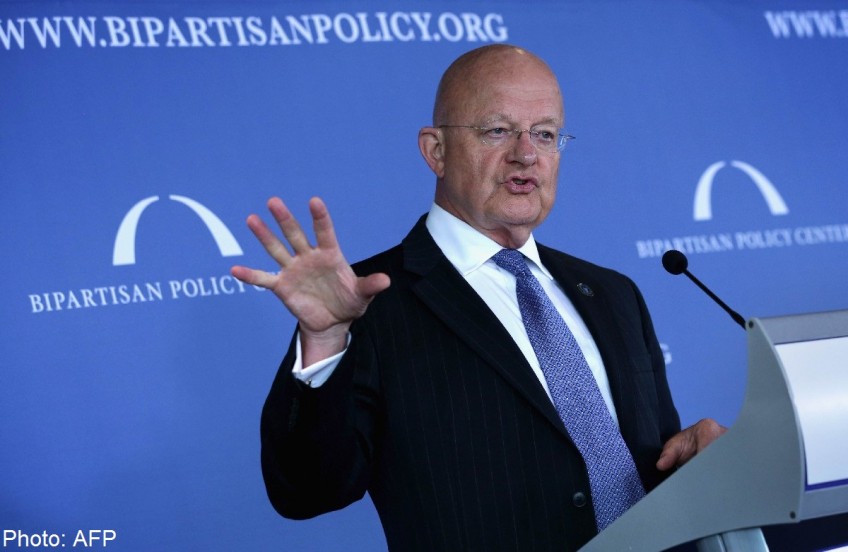Snowden: Clapper comments pushed me to become leaker

WASHINGTON - Edward Snowden says dishonest comments to Congress by the US intelligence chief were the final straw that prompted him to flee the country and reveal a trove of national security documents.
In an interview with Wired magazine over several days in Moscow, Snowden said he had been long been troubled by the activities of the National Security Agency, which employed him as a contractor.
But it was only when Director of National Intelligence James Clapper told lawmakers that the agency does "not wittingly" collect data on millions of American citizens that he was angry enough to act.
The magazine released the article online on Wednesday, along with several new photographs of the once elusive Snowden, including a cover shot of the young technician lovingly cradling an American flag.
Snowden says he made his decision to leave his office in Hawaii and head to Hong Kong with secret documents on thumb drives after reading in March 2013 about Clapper briefing a Senate committee.
"I think I was reading it in the paper the next day, talking to coworkers, saying, can you believe this...?" Snowden says.
Following Snowden's sensational leaks about the scale of US global surveillance and how the NSA sucks up data on US users' phone calls, Clapper apologised to the Senate for his "erroneous" remarks.
Snowden told Wired that he had already thought about "whistle-blowing" several times over the previous few years.
Journalist Glenn Greenwald, who was later given the thousands of secret NSA files, has said Snowden contacted him anonymously in December 2012, three months before Clapper's briefing.
Political radicals
Snowden told Wired he had been troubled by other discoveries in his work with the agency, including that the NSA was spying on the pornography-viewing habits of political radicals.
"It's much like how the FBI tried to use Martin Luther King's infidelity to talk him into killing himself," he said.
"We said those kinds of things were inappropriate back in the '60s. Why are we doing that now?" Snowden was also disturbed by the NSA's effort to massively speed up data collection with a secret data storage facility in Bluffdale, Utah, which scanned billions of phone calls, faxes, emails, computer-to-computer data transfers and text messages from around the world.
He told Wired he put off his plan to leak NSA secrets at the time of the election of President Barack Obama, hoping for a more open government.
But he became disenchanted with the president, and by 2013 was ready to spill the secrets he had acquired.
'The boiling frog'
After Clapper's testimony to Congress, Snowden said his colleagues did not appear shocked, but he was concerned he was getting too deep into an "evil" system.
"It's like the boiling frog," he says, in a reference to the fable that a frog placed in cold water over a hob fails to realise the water is heating up gradually until it is too late.
"You get exposed to a little bit of evil, a little bit of rule-breaking, a little bit of dishonesty, a little bit of deceptiveness, a little bit of disservice to the public interest, and you can brush it off, you can come to justify it," he told the magazine.
"But if you do that, it creates a slippery slope that just increases over time, and by the time you've been in 15 years, 20 years, 25 years, you've seen it all and it doesn't shock you.
"And so you see it as normal. And that's the problem, that's what the Clapper event was all about." In a series of interviews in Moscow with journalist James Bamford - conducted under tight security precautions - Snowden appeared "relaxed and upbeat," the writer said In three days of interviews over several weeks, Snowden told the magazine that he is willing to end his exile in Moscow and face prison in the United States "as long as it served the right purpose." "I care more about the country than what happens to me," he said.
"But we can't allow the law to become a political weapon or agree to scare people away from standing up for their rights, no matter how good the deal." The Wired report also revealed the existence of a document on a secret programme code-named MonsterMind, which can detect cyber attacks and automatically respond, without human involvement.
Political death
Snowden said this was troubling because attacks are often routed through computers in innocent third countries and the source can be "spoofed." "You could have someone sitting in China, for example, making it appear that one of these attacks is originating in Russia," he said. "And then we end up shooting back at a Russian hospital." Snowden said he believes that somewhere in his trove of documents may be information which may be further damaging to the US intelligence community.
"I think they think there's a smoking gun in there that would be the death of them all politically," he said.
Asked about the report, an NSA spokeswoman said in a statement, "If Mr. Snowden wants to discuss his activities, that conversation should be held with the US Department of Justice. He needs to return to the United States to face the charges against him."